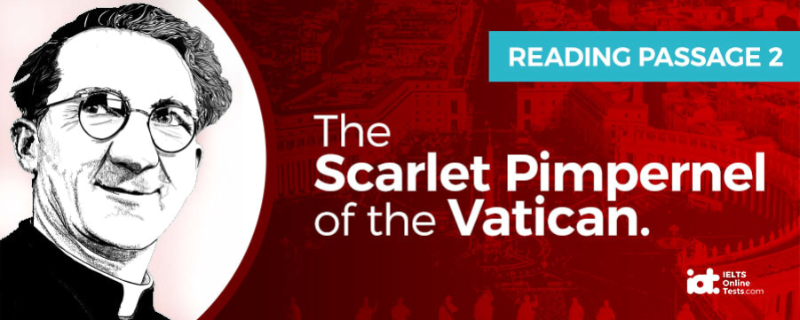PART 2
READING PASSAGE 2. You should spend about 20 minutes on Questions 14-26, which are based on Reading Passage 2 below.

The Scarlet Pimpernel of the Vatican
Born in Kiskeam in his mother's native North Cork, Hugh O'Flaherty was brought up in Killarney, where his father was the steward of a local golf club. He was the eldest of four children, and, from an early age, appeared to have a vocation for the priesthood. His fondness for the church was formed in part during his education, which began at Presentation Brothers' School in a local monastery in his home town. He later attended Waterford College, but the priesthood was always going to be his calling, so he applied to Mungret College in Limerick and was accepted into the seminary there. He was posted to Rome as a young seminarian in 1922, the year in which Mussolini came to power. While studying in Rome, he earned a degree in theology and was ordained in 1925 before going on to study there for a further two years, earning his doctorates in divinity, canon law and philosophy.
O'Flaherty, posted at various times over the next few years in Egypt, Haiti, San Domingo and Czechoslovakia, as well as Palestine, soon proved himself a very able diplomat. His golfing skills were also noted, and he developed a number of high-profile connections in Italy through the world of golf, often playing with the likes of ex-king Alfonso of Spain and Count Ciana, Mussolini's son-in-law. These people were no doubt impressed by the golfing talents of the man, which were, considering he had been playing the game since early childhood and was a natural, by then rather impressive to say the least. O'Flaherty would come to rely on his high profile, aswell as his 'high' connections in the coming years as war broke out in Europe and Italy aligned itself with Hitler's Germany and its policy of discriminating againstminority groups. His connections would give him the power and influence to make a difference to the lives of thousands of innocent people when the time came, whilsthis high profile made the German and Italian authorities slow to move against him.
In the autumn of 1942, the Germans and Italians started to crack down on prominent figures they viewed as being hostile to their goals. As their policiesbecame more and more extreme, many people started to become alarmed by fascist propaganda. The German and Italian governments were not interested injustice, they were aligned on an ideological level and started to execute their policy of ethnically cleansing Italy of the so-called 'unwanted': Jews, blacks, gypsies and so on. O'Flaherty, on the other hand, having socialised with many prominent Jews throughout his time in Italy, did not adhere to the Nazi ideology, and it was then that he started to act, protecting innocent Jews and other victims of injustice, and keeping them away from the claws of the Italian and German police, whose orders were to ship them to concentration camps.
O'Flaherty used his old college and indeed his own official residence as hiding places for the people he was trying to protect. As the situation got more and more desperate, and the numbers of people threatened grew, he even turned to using monasteries and convents as hideouts, calling in favours from old friends in these places who, by agreeing to house the 'unwanted', were not just risking a reprimand from the fascists had they been caught but were endangering their own lives by being party to O'Flaherty's campaign. In the summer of 1943, O'Flaherty extended his efforts to include helping escaped British prisoners-of-war and shot-down allied airmen. Calling once again on his contacts, he developed a network of apartments in which to house them until their safe return to Britain could be arranged.
By the end of the war, over 6,500 Jews and American and British soldiers had O'Flaherty to thank for their escape from the Germans and a nearly certain death. His success in never being identified when on unauthorised rescue missions outside of Vatican City, and in smuggling Jews and allied airmen inside the city led to him being given the nickname the Scarlet Pimpernel of the Vatican, an acknowledgement of how much the master of disguise O'Flaherty had become. After the war, O'Flaherty continued to serve in Rome and received many accolades, including the US Medal of Freedom and the title Commander of the British Empire. The fledgling Jewish state of Israel also recognised O'Flaherty's contribution by proclaiming him Righteous among the Nations.
In 1960, O'Flaherty retired and went home to Ireland to a town called Cahirsheveen. There he lived for the remainder of his life until he died on the 30th October 1963. His death was mourned throughout the world and the prestigious New York Times carried a front-page tribute in his honour.
Margaret Mead once said: 'Never doubt that a small group of thoughtful, committed, citizens can change the world. Indeed, it is the only thing that ever has'. O'Flaherty and his loyal group of helpers within the Vatican and without are exactly the kind of people she was referring to. In life, he saved thousands of innocent Romans; in death, he is remembered as a man who bravely stood up to extremism and who was not prepared to turn a blind eye to injustice.
Questions 14-16. Choose the correct letter, A, B, C or D.
14. O’Flaherty went to Rome